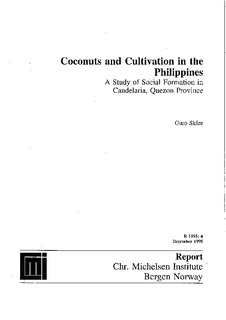| dc.contributor.author | Skåre, Guro | |
| dc.date.accessioned | 2008-03-11T13:31:47Z | |
| dc.date.accessioned | 2017-03-29T09:13:01Z | |
| dc.date.available | 2008-03-11T13:31:47Z | |
| dc.date.available | 2017-03-29T09:13:01Z | |
| dc.date.issued | 1995 | |
| dc.identifier.issn | 0805-505X | |
| dc.identifier.uri | http://hdl.handle.net/11250/2436001 | |
| dc.description.abstract | This study gives a detailed account of coconut production and the social formation of coconut cultivators in a specific locality in the Quezon province on the island of Luzon in the Philippines. Using a theoretical framework drawn from Marxism, the social formation analysed mixes elements from both the feudal and the capital mode of production. The mixture explains the stagnancy of production and the poverty of the cultivators and also the macropolitical context of a privatised state with family dynasties in control to the detriment of the economy and development in general. The study recommends that the appropriate remedy is comprehensive land reform combined with productivity enhancements in the coconut producing sector. If no structural reform is undertaken, stagnancy and deepening poverty will continue to prevail.
Guro Skåre was affiliated to the CMI preparing her MA dissertation at Institute of Geography, University of Bergen. Her main interest of studies is how the feudal inheritance manifest itself in developing countries, and how the feudal challenges can be conquered by development strategies. | |
| dc.language.iso | eng | |
| dc.publisher | Chr. Michelsen Institute | |
| dc.relation.ispartofseries | Research report | |
| dc.relation.ispartofseries | R 1995: 4 | |
| dc.subject | Agricultural production | |
| dc.subject | Coconuts | |
| dc.subject | Peasantry | |
| dc.subject | Philippines | |
| dc.title | Coconuts and Cultivation in the Philippines. A Study of Social Formation in Candelaria, Quezon Province | |
| dc.type | Research report | |
